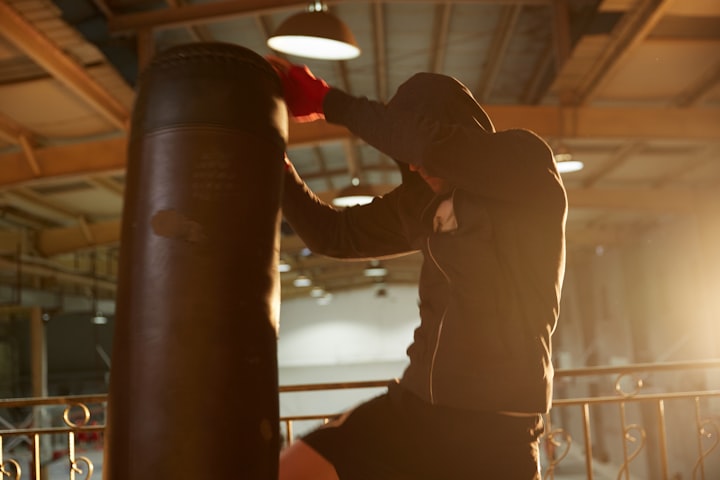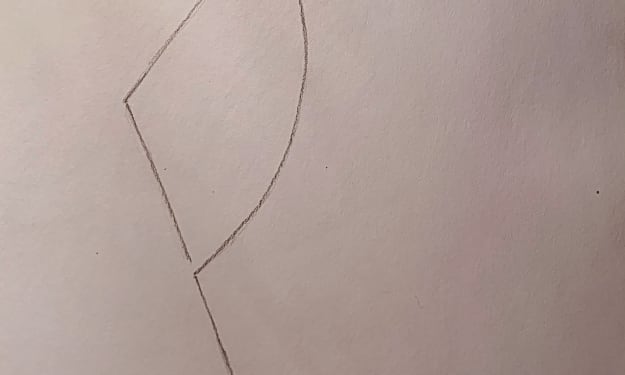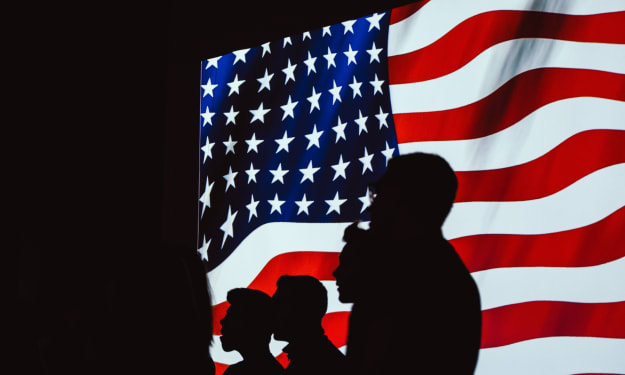Gifts from my parents, like my first heavy bag and wraps, often came as solutions to what was given to me in far more precious and formative years. They bought stuff to solve the problems that came with these early, less material gifts. I remember most fondly the Everlast blend of poly-foam in leather that hung from the basement of my childhood home. It was a later offering to temper The Rage–one of Mother’s first gifts to me.
I remember the fury leaving my body as breath exploded upon phalangeal contact, needles gently rippling across the flesh of my forearm and bicep with each blow– fibromyalgia ensuring it felt more like self-flagellation than self-improvement, precisely how I wanted it.
The mental state of a young, undiagnosed, and unmedicated bipolar person is tumultuous, unpredictable, and volatile. That’s a generous read of my cognition at the time, and I give it only to point out that Mother gave several gifts besides The Rage that the heavy bag served. The dysregulation, paranoia, and fear that come with bipolar, whether you are aware of your condition or not, are easily soothed by the repetitive and full-body strengthening motions of boxing and martial arts. She may not have known this, but she had the sense that fights with other children might stop if I had an object to release The Rage on. She was right. Mostly.
I kept The Rage alive as a young adult, though contained, the heavy bag and wraps following me out of the agricultural middleland of the lower peninsula. They helped keep what would have otherwise been acts of social seppuku at bay. I couldn’t continue to pick fist fights beyond my teen years and live to tell the tale, at least not outside an institution. Instead, I funneled the seemingly ever-present gift of Rage into a relentless stream of selfish and self-destructive decisions. What wasn’t released psychologically or socially, I took out on the heavy bag as a last-ditch effort to relieve the mounting pressure of my still undiagnosed disorder.
What felt necessary once I received my diagnosis, uncovered those inherited gifts, and brought them to the surface of my awareness seemed cruel; a death needed to occur. I realized my mother’s voice echoed the insecurities fueling The Rage. In her voice, a judgment rang, full of certainty, setting me apart and adrift. I was raging in my untreated stupor, the gifts’ death grip on my sanity unwavering until this realization. Finally, to loose myself from its hold, I killed her voice and, with it, the image of myself that it demanded. Rashness did not strike me as the nature of this response until long after when the drudgery of a quiet and more forgiving mind settled in. Peace and clemency are not bad, just boring when you spend nearly twenty-five years in crisis.
I felt as though I had betrayed my mother and other fierce, uncompromising women for a life that was less free than the one she had intended me to have, one that was numb and disconnected. The betrayal was my rejection of the gift meant to protect me from harm and propel me out of apathy. The shame was denying my mother’s goodness with that rejection. I had little concept of ‘good’ then–though obsessed with the construct–and thought conflictless, agreeable, and neutral meant ‘good,’ as opposed to anything about substantive growth, change, or disruption. Instead of reframing the mighty tool she left me, I gave it up, convinced I was becoming a better person for it.
Erinyes, daughters of Gaea, known better as The Furies and for their vengeful curses, appear to have forgiven me for this particular form of matricide. It seems killing the voice you hear of your mother or her influence over you is not nearly as damning as, say, the crime of Orestes, who killed his actual mother. While The Furies cursed him for the dishonor of his murder, my life is arguably not condemned. Sure, we’re entering the era of yet another genocide and a sixth mass extinction, but I am housed; I am fed; I am loved.
Perhaps that’s the problem, though; I’m thinking of the individual when The Furies were known to have cursed entire nations for knowingly housing people like myself and Orestes. Are great swaths of people suffering, our country in the throws of self-destruction, and our planet on the cusp of the same because of a sexist mythology? Of course not; the capacity to believe in a god does not preclude the ability to think critically, nor does it make a god real in any meaningful way. However, great swaths of people are suffering, our country is in the throws of self-destruction, and our planet is on the cusp of the same because of people like myself and Orestes. That is, in fact, the case; it’s just not because of vengeful goddesses seeking justice against us. More likely, it is because some people, like myself, rely heavily on the convenience of a ready-made albeit troubled world to offer predictability and a sense of safety. Whether it be disability, queerness, neurodivergence, etc., through such experience, we can see the difficulty in stridently going against the grain. Our culture holds just enough space for these marginal identities to exist, let alone world-build. For others, like Orestes, a commitment to maintaining social power dictates adherence to the status quo. Whiteness, straightness, or cis-ness are a couple of normative identities that may impact an individual’s willingness (or lack thereof) to change a ready-made world. In both cases, self-interest can outweigh the altruistic.
Orestes was the son of Agamemnon, a man famous for his rage and selfishness. And, as far as apples and trees are concerned, they did not stray far from each other’s character. One could argue that Orestes was wholly justified in the slaying of his mother and that Clytemnestra had it coming–after all, she conspired against and killed his father with her lover–but that would ignore how lusciously prideful Orestes was and how dangerously close his apple fell to his father’s petty tree. The truth about people like Orestes, Agamemnon, or myself is we think we’re one of, if not the most intelligent person in the room. Although my manic delusions may not count as true ego or a superiority complex, the selfishness and pride induced by them are identical.
The lawlessness of Orestes’ murder is not the problem. After all, Apollo told him to do it. And the impassivity of my medicated self is not the sin; I’m merely trying to survive. It is hubris. It is Orestes thinking he justly sought revenge despite being petty his whole life. It is me thinking my mother’s knowledge or experience is irrelevant to my own.
Hubris, which originates in Greek mythology, refers to an individual’s overconfidence in their capabilities, noting that acts of defiance are the essence of this term.
The lesson is that a leveling must occur when a human is so prideful and self-assured that they insist they know best, even in the face of Truth (e.g., philosophical/scientific/personal fact or the goddess Aletheia herself).
My pride was thinking I knew my mother better than she knew herself, thinking she had nothing to offer me and that I, in turn, had nothing more to learn from her. It was taking the gift she had given me, The Rage, and carelessly cutting it out. Instead of trusting and cherishing the use of such a gift, I quieted what I construed as madness, quelling a righteous beast. Although, at times, I was the unfortunate and unsuspecting victim of my mother’s Rage, I see removal was not the only option. Learning self-regulation surely would have been better than anesthetizing—my curse since has been a disquiet mind, my punishment the apathy that comes with over-medication.
While treating a case of Bipolar Disorder is nothing to take lightly, it would be a disservice to me and perhaps others to say that every aspect of the ailment needs undoing. As it stands, I have complied with doctors' orders, maintaining a therapeutic level of mood stabilizers and anti-depressants in my system, so I feel more capable of playing by societal rules. I have met the rigors of capitalism because I adhered to Western understandings of behavior, personality, and mental health. I am a functional, productive, and contributing member of the labor force. I teach. I am calm, often bordering on complacency, emphasizing the word's ‘uncritical’ aspect. And, for this, I still suffer. Differently, but suffering nonetheless. I feel empty. Flat. The simple fact that I no longer wish to felo de se isn’t enough. Not anymore. I miss speaking quickly and confidently, unimpeachable, because of my performance of certainty. I miss the synthesis of information that happened in my unmedicated brain, the rate at which I processed new knowledges. I miss knowing I’m right because my gut is bursting out of my body with intuition. I miss emotionality and the access that gave me to intimacy, connection, and love. I know I can’t raw dog my psychoses, but there has to be a better answer than shutting off a large spectrum of my emotional experience.
What I know about this and myself is that it’s not much unlike anyone else. I do not stand out from any given crowd except perhaps a heterosexual one. In that regard, I may consider myself different, but still like Others, particularly those queered to sex and gender norms. Therefore, I may think The Rage typical, and perhaps even the quest to shut it up mundane. Might I extrapolate even further that many of us, like myself, have done it all wrong? How many of us suffer directly from our attempts to rid ourselves of suffering?
A generation of avoiders and escape artists–millennials who never left a state of existential dread–attempt to slay ancestral traumas with social mobility, the bootstrap theory of rugged individualism that taught my mother and many others, The Rage, in their youth. Entitled only to our lives, we labor as we always have, seeking to make our life an exemplar of living well, something we are not guaranteed. Instead of holding this model and our ancestors to task, we repeat the cycles of abuse, violence, and status-seeking responsible for all manner of death.
Our foundational miseducation led many of my generation and generations before mine to trust, uncritically, a promise made to all but kept only to some. For others, they have no trust. They see the failure of this model to meet most people's basic needs, let alone allow them the capacity to thrive and flourish, as intentional—a lie built into the fabric of a system hell-bent on profit, profit, profit. Without the poor, there would be no rich. With no sinners, there are no saints. Of the people who see this relationship, we find those who exploit it and those who strive against it. Those who don’t see it are the ones who still believe the promise that if they work hard enough, they can achieve anything.
Oh, Orestes, I swear I’ll get back to you.
Mother was, as mothers often are, connected to her children with a primordial devotion that could border on unhealthy at times. In others, it saved lives. Knowing the difference became the exacting task of adulthood—codependence versus interdependence. Why, yet again, our social priming prepared many of us for codependence instead of a healthier interdependence can be explained by our obsession with the individual. Again, assuming many are in the same boat as me, it may be safe to say that while we may be working to unlearn the codependence of our parents, this task largely remains unchecked on the proverbial to-do list. Why? Because of the scrutiny and critiques of peers. Western society would rather you stay with your abusive husband, leave that racist uncle alone, or deny the existence of queerness because misogyny, racism, and all forms of bigotry, in general, keep us in the mindset of individualism: us versus them, me versus everybody, nobody more crucial than the Self. Being interdependent flies in the face of capitalist values. It’s too collective, too considerate, too communal. I believe that individualism begets codependence. It creates the conditions necessary for unhealthy, alarming levels of codependence that leave us vulnerable to repeating cycles of abuse and violence and the misappropriation of our ancestral gifts. How? It isolates us and makes us too confident in that isolation that we, as an individual, matter most. We’re too sure we’re right about the importance of the nuclear family, the precariousness of a city street after dark, or the miraculous role of our Will in achieving goals that we refuse to see other possibilities: intimacy in myriad forms, neighbors in strangers, or privilege in our successes. It makes us desperate, lonely, and weaker.
Orestes, this is where you come back in. Much like myself, you wrote off The Rage of your Mother, as righteous as it was. Clytemnestra raged against the abuses of a powerful husband, a man you idolized; my mother raged against the abuses of a powerless father, a man I despised. Both women clung to disobedience to express freedom, and we rebuked that. You, in your camaraderie with your father, and me in my insistence that I would be anyone but my mother. I may not have loved Lawrence as you loved Agamemnon, but somehow, we have done our part to preserve the legacies of brutal men who wronged our bearers. What are we, Orestes, if not complicit in our mothers’ oppression?
The heavy bag and wraps disappeared from my life for a time and reappeared recently. However, they sit in my backyard, unused, collecting cobwebs and precipitation. I severed my connection to The Rage, and now I don’t even feel like speaking up, let alone lashing out. That was the sacrifice for “control.” Or so I thought. I gave up self-advocacy. What once would have been a brawl is now a quiet stream in my head. Where fighting once seemed necessary, now all I care to do is retreat. The only conflicts I allow myself to engage in these days are ideological, and even then, I keep it safe. Family, be it chosen or blood, is the safest. That stranger talking out of pocket? I don’t contend with that.
That’s not to say I shouldn’t. I think it’s the very problem I’m speaking to now. I, meaning we, in the same way I extrapolated earlier, do not build kin or community very well. Of course, this does not mean all. It never does. Many of my generation lead their lives with certainty, wielding their ancestors' gifts with pride and clarity regarding their appropriate uses. They divine the power and knowledge from those experiential lessons, familial ties, and ancestral gifts, allowing the possibility for change; kinship naturally flows from there.
Like many others, I remain stuck, repressed, and tethered, clinging to old truths in the face of new information. My need for control sabotages my desire for honesty; my silence is a regressed expression of people pleasing (i.e., manipulation). I remain static so that my privilege, even if challenged, remains untouched. However, that privilege is the dissociative responsible for obedience, apathy, and, ultimately, the perpetuation of oppression: mine and everyone else’s.
Orestes, this is where we went wrong. We aligned ourselves with men and the privilege they created and perpetuated. We didn’t just kill our mothers, Orestes; we killed the key to our salvation.
About the Creator
kp
I am a non-binary, trans-masc writer. I work to dismantle internalized structures of oppression, such as the gender binary, class, and race. My writing is personal but anecdotally points to a larger political picture of systemic injustice.







Comments (1)
this was such a wonderful story. I loved it!